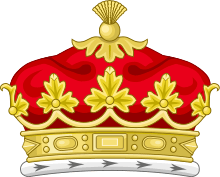Duke of Gloucester
Duke of Gloucester (/ˈɡlɒstər/) is a British royal title (after Gloucester), often conferred on one of the sons of the reigning monarch. The first four creations were in the Peerage of England and the last in the Peerage of the United Kingdom; the current creation carries with it the subsidiary titles of Earl of Ulster and Baron Culloden.
| Dukedom of Gloucester | |
|---|---|
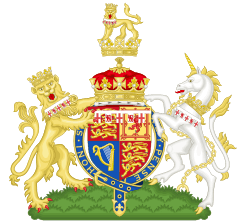 | |
| Creation date | 31 March 1928 |
| Creation | Fifth |
| Monarch | George V |
| Peerage | Peerage of the United Kingdom |
| First holder | Prince Henry |
| Present holder | Prince Richard |
| Heir apparent | Alexander Windsor, Earl of Ulster |
| Remainder to | the 1st Duke's heirs male of the body lawfully begotten |
| Subsidiary titles | Earl of Ulster Baron Culloden |
| Status | Extant |
The title was first conferred on Thomas of Woodstock, the thirteenth child of King Edward III. The title became extinct at his death, as it did upon the death of the duke of the second creation, Humphrey of Lancaster, fourth son of King Henry IV.
The title was next conferred on Richard, brother to King Edward IV. When Richard himself became king, the dukedom merged into the crown. After Richard's death, the title was considered ominous, since the first three such dukes had all died without issue to inherit their titles. The title was not awarded for over 150 years: the next to receive the dukedom was the son of King Charles I, Henry Stuart, upon whose death the title again became extinct.
Prince William, son of the future Queen Anne, was styled "Duke of Gloucester" for his whole life (1689–1700), but was never formally created duke. Frederick, Prince of Wales, was styled "Duke of Gloucester" from 1718–1726, but was then created Duke of Edinburgh rather than of Gloucester.
There was next a creation of a double dukedom (not two dukedoms) for the brother of King George III, Prince William Henry, his proper title becoming "Duke of Gloucester and Edinburgh".
The fifth and most recent creation was for the Prince Henry, son of King George V. Upon Prince Henry's death, the dukedom was inherited by his son Prince Richard, who still holds the title. The heir to the title is Alexander Windsor, styled Earl of Ulster. The next in the line of succession is the Earl of Ulster's son Xan Windsor, known by his grandfather's third title of Lord Culloden. The royal dukedom will devolve into an ordinary one when inherited by Alexander Windsor; as a great-grandson of a sovereign he lacks any royal style. Therefore, he will be styled as His Grace The Duke of Gloucester.
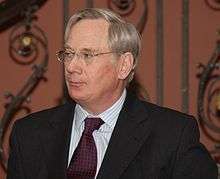
Dukes of Gloucester
First creation, 1385–1397
| Duke | Portrait | Birth | Marriages | Death |
|---|---|---|---|---|
| Thomas of Woodstock House of Plantagenet 1385–1397 also: Duke of Aumale (1385–1397), Earl of Essex (1376–1397), Earl of Buckingham (1377) | .jpg) | 7 January 1355 Woodstock Palace son of Edward III of England and Queen Philippa | Eleanor de Bohun 1376 5 children | 8 September 1397 Calais aged 42 |
| Thomas of Woodstock's son died two years after his father, but never succeeded to his titles except that of Earl of Buckingham. At the time of Thomas's death, he was regarded as a traitor and thus his titles were forfeit after his murder (except Earl of Buckingham). His son had no issue and his male line died out in 1399. | ||||
Second creation, 1414–1447
| Duke | Portrait | Birth | Marriages | Death |
|---|---|---|---|---|
| Humphrey of Lancaster House of Lancaster 1414–1447 also: Earl of Pembroke (1414) | 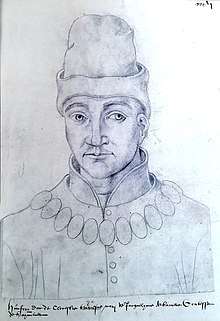 | 3 October 1390 Lancaster Castle son of Henry IV of England and Mary de Bohun | Jacqueline, Countess of Hainaut 1422–1428 (annulled) 1 child (stillborn) Eleanor de Cobham 1428–1441 (annulled) 2 children | 23 February 1447 Bury St Edmunds aged 56 |
| Before marrying Humphrey, Eleanor de Cobham was his mistress. At the time of Humphrey's 1447 death, he had two children, Arthur and Antigone. However, both children were born before his marriage to Eleanor and were thus illegitimate and could not succeed to his titles. | ||||
Third creation, 1461
| Duke | Portrait | Birth | Marriages | Death |
|---|---|---|---|---|
| Richard Plantagenet House of York 1461–1483 |
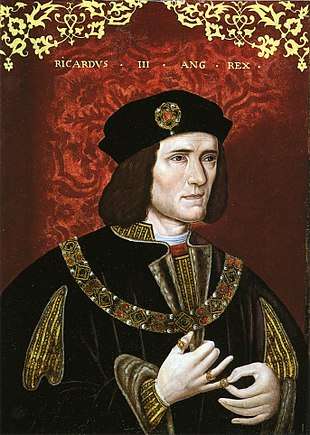 |
2 October 1452 Fotheringhay Castle, Oundle son of Richard, Duke of York and Cecily Neville |
Anne Neville 1472–1485 (her death) 1 child |
22 August 1485 Bosworth Field aged 32 |
| Richard succeeded as Richard III in 1483 upon his nephew's disappearance, and his titles merged with the crown. | ||||
Fourth creation, 1659
| Duke | Portrait | Birth | Marriages | Death |
|---|---|---|---|---|
| Henry Stuart House of Stuart 1659–1660 also: Earl of Cambridge (1659) |
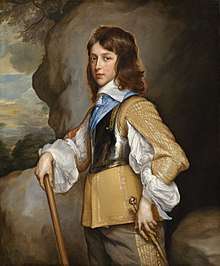 |
8 July 1640 Oatlands Palace, Oatlands son of King Charles I and Queen Henrietta Maria |
Never married | 18 September 1660 Whitehall, London aged 20 |
Only styled, 1689
| Duke | Portrait | Birth | Marriages | Death |
|---|---|---|---|---|
| Prince William House of Oldenburg 1689–1700 |
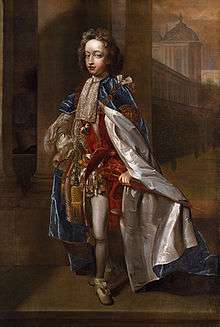 |
24 July 1689 Hampton Court Palace, London son of Queen Anne and Prince George |
Never married | 30 July 1700 Windsor Castle, Windsor aged 11 |
Only styled, 1717
| Duke | Portrait | Birth | Marriages | Death |
|---|---|---|---|---|
| Prince Frederick House of Hanover 1717–1726 |
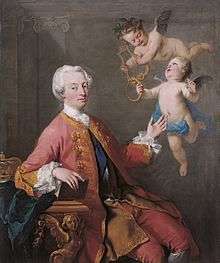 |
1 February 1707 Leineschloss, Hanover son of King George II and Queen Caroline |
Princess Augusta of Saxe-Gotha 17 April 1736 9 children |
31 March 1751 Leicester House, London aged 44 |
| Prince Frederick became Duke of Edinburgh in 1726 and then Prince of Wales in 1729. | ||||
Fifth creation, 1928
| Duke | Portrait | Birth | Marriages | Death |
|---|---|---|---|---|
| Prince Henry House of Windsor 1928–1974 also: Earl of Ulster and Baron Culloden (1928)[1] |
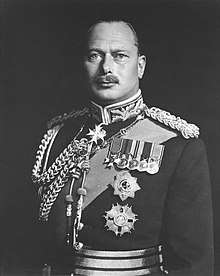 |
31 March 1900 York Cottage, Sandringham son of King George V and Queen Mary |
Lady Alice Montagu Douglas Scott 6 November 1935 2 children |
10 June 1974 Barnwell Manor, Barnwell aged 74 |
| Prince Richard House of Windsor 1974–present also: Earl of Ulster and Baron Culloden (1928) |
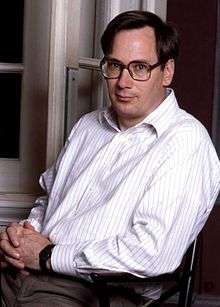 |
26 August 1944 St. Matthew's Nursing Home, Northampton son of Prince Henry and Princess Alice |
Birgitte van Deurs 8 June 1972 3 children |
– now 75 years, 358 days old |
Line of succession
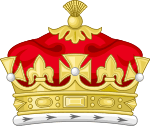
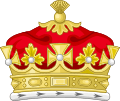

- (1) Alexander Windsor, Earl of Ulster (born 1974)
- (2) Xan Windsor, Lord Culloden (born 2007)
- (1) Alexander Windsor, Earl of Ulster (born 1974)
Family tree
| King Edward III (1312–r.1327–1377) | |||||||||||||||||||||||||||||||||||||
| DUKE OF GLOUCESTER, 1385 | |||||||||||||||||||||||||||||||||||||
| John of Gaunt, 1st Duke of Lancaster (1340–1399) | Thomas of Woodstock, Duke of Gloucester (1355–1397) | ||||||||||||||||||||||||||||||||||||
| King Henry IV (1367–r.1399–1413) | John Beaufort, 1st Earl of Somerset (1373–1410) | Joan Beaufort (c. 1379–1440) m.(2) 1st Earl of Westmorland | |||||||||||||||||||||||||||||||||||
| DUKE OF GLOUCESTER, 1414 | |||||||||||||||||||||||||||||||||||||
| King Henry V (1386–r.1413–1422) | Humphrey of Lancaster, Duke of Gloucester (1390–1447) | John Beaufort, 1st Duke of Somerset (1404–1444) | Cecily Neville (1415–1495) m. 3rd Duke of York | ||||||||||||||||||||||||||||||||||
| Catherine of Valois widow of Henry V m.(2) Owen Tudor | |||||||||||||||||||||||||||||||||||||
| DUKE OF GLOUCESTER, 1461 | |||||||||||||||||||||||||||||||||||||
| King Henry VI (1421–1471, r.1422–61, 1470–71) | Edmund Tudor, 1st Earl of Richmond (1431–1456) | Lady Margaret Beaufort (1443–1509) | King Edward IV (1442–1483, r.1461–70, 1471–83) | Richard, Duke of Gloucester King Richard III (1452–r.1483–1485) | |||||||||||||||||||||||||||||||||
| King Henry VII (1457–r.1485–1509) | Elizabeth of York (1466–1503) | ||||||||||||||||||||||||||||||||||||
| King Henry VIII (1491–r.1509–1547) | Princess Margaret Tudor (1489–1541) m. James IV of Scotland | ||||||||||||||||||||||||||||||||||||
| Edward VI (1537–r.1547–1553) Mary I (1516–r.1553–1558) Elizabeth I (1533–r.1558–1603) | James V of Scotland (1512–1542) | ||||||||||||||||||||||||||||||||||||
| Mary, Queen of Scots (1542–1587) | |||||||||||||||||||||||||||||||||||||
| King James VI & I (1566–r.1603–1625) | |||||||||||||||||||||||||||||||||||||
| Princess Elizabeth Stuart (1596–1662) m. Frederick V of the Palatinate | King Charles I (1600–r.1625–1649) | ||||||||||||||||||||||||||||||||||||
| DUKE OF GLOUCESTER, 1659 | |||||||||||||||||||||||||||||||||||||
| Sophia of Hanover (1630–1714) m. Ernest Augustus of Brunswick | King Charles II (1630–r.1660–1685) | King James II (1633–1701, r.1685–1688) | Prince Henry, Duke of Gloucester (1640–1660) | ||||||||||||||||||||||||||||||||||
| King George I (1660–r.1714–1727) | Queen Mary II (1662–r.1689–1694) | Queen Anne (1665–r.1702–1714) | |||||||||||||||||||||||||||||||||||
| styled DUKE OF GLOUCESTER | |||||||||||||||||||||||||||||||||||||
| King George II (1683–r.1727–1760) | Prince William, Duke of Gloucester (1689–1700) | ||||||||||||||||||||||||||||||||||||
| styled DUKE OF GLOUCESTER | |||||||||||||||||||||||||||||||||||||
| Prince Frederick Louis, Duke of Gloucester, Prince of Wales (1707–1751) | |||||||||||||||||||||||||||||||||||||
| DUKE OF GLOUCESTER & EDINBURGH, 1764 | |||||||||||||||||||||||||||||||||||||
| King George III (1738–r.1760–1820) | Prince William Henry, 1st Duke of Gloucester and Edinburgh (1743–1805) | ||||||||||||||||||||||||||||||||||||
| King George IV (1762–r.1820–1830) | King William IV (1765–r.1830–1837) | Prince Edward, Duke of Kent (1767–1820) | Princess Mary (1776–1857) | Prince William Frederick, 2nd Duke of Gloucester and Edinburgh (1776–1834) | |||||||||||||||||||||||||||||||||
| Queen Victoria (1819–r.1837–1901) | |||||||||||||||||||||||||||||||||||||
| King Edward VII (1841–r.1901–1910) | |||||||||||||||||||||||||||||||||||||
| King George V (1865–r.1910–1936) | |||||||||||||||||||||||||||||||||||||
| DUKE OF GLOUCESTER, 1928 | |||||||||||||||||||||||||||||||||||||
| King Edward VIII (1894–1972, r.1936) | King George VI (1895–r.1936–1952) | Prince Henry, 1st Duke of Gloucester (1900–1974) | |||||||||||||||||||||||||||||||||||
| Queen Elizabeth II (1926–r.1952–) | Prince William of Gloucester (1941–1972) | Prince Richard, 2nd Duke of Gloucester (1944–) | |||||||||||||||||||||||||||||||||||
See also
- List of dukedoms by reign
- Earl of Gloucester
External links
- Duke of Gloucester
- Chisholm, Hugh, ed. (1911). . Encyclopædia Britannica. 12 (11th ed.). Cambridge University Press. pp. 128–129.
